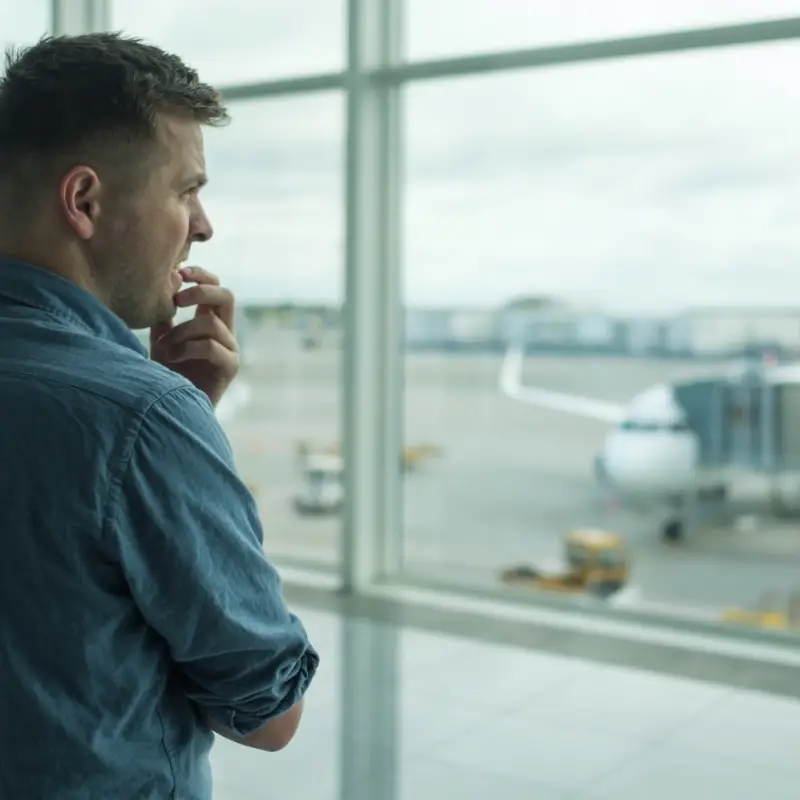Rewire Your Brain's Response to Fear
Rewire Your Brain's Responses to Phobias
Discover freedom from fears with personalized strategies that work.
With online therapy designed for rapid relief you can eliminate phobias, dissolve fears and open the door to new possibilities.

Flying
Overcoming the fear of flying opens up a world of possibilities. You'll travel without anxiety, explore new places, advance your career, and create lasting memories.
You'll gain confidence to enjoy adventures that were once off-limits.Insects or Animals
Overcoming your fear of spiders, insects, dogs, or other animals can really change your life. You'll be able to visit friends with pets, join in on camping trips, and enjoy nature without worry.
Live your life more fully, with more freedom and less stress.Dirt, Germs & Health
Overcoming fears of dirt, germs, and health anxiety can really change how you enjoy life. You'll enjoy outdoor activities, socialize freely, and explore new places and experiences without stress.
It's like opening a door to a world where fear doesn't control you.
Fears and phobias can make everyday life incredibly challenging
You’re sitting at your desk, trying to focus on your tasks.
But instead, you’re consumed by anxiety over a potential encounter with your phobia, be it spiders in the corner, germs on the canteen cups or the claustrophobic feeling of a crowded meeting room.
This constant state of fear not only hampers your productivity but also affects your morale and self-esteem.
You might find yourself avoiding certain tasks or areas of your workplace, limiting your opportunities for growth and advancement.
It doesn’t have to be this way, you can dissolve fears and feel calm and confident.

Transform your life when you break free from fears and phobias
Overcoming fears and phobias can revolutionize both your work and personal life.
At work, it means increased confidence and opportunities for growth, as you engage more actively and fearlessly in tasks and interactions.
This not only enhances your productivity but also positions you for career advancements.
In your personal life, conquering these fears opens up a world of enjoyment and deeper connections.
Activities and social events become sources of happiness, not anxiety, improving your relationships and overall quality of life.
You can live life to the full – let’s get you where you want to be in life.

Examples of how BWRT can help to eliminate fears and phobias
Decision-making becomes more objective and less influenced by the fear of negative outcomes. Moving past failure builds resilience and confidence.
This newfound confidence leads to improved communication skills, better professional opportunities, and an overall enhancement in your quality of life.
This enables you to improve your self-perception and feel comfortable with who you really are, able to realize your potential personally and professionally.
How can BWRT help to treat fears and phobias?
If you have a phobia you can experience an overwhelming fear and desire to avoid that trigger situation.
Contrary to popular belief, most phobias are not caused by a single traumatic event, so don’t worry if you can’t remember why or when it started. The most important thing is not how it started but how to stop it.
Treating phobias with BWRT is an effective and safe method to get back control of your life.
From a therapeutic point of view, it is the response that the phobia creates that is important.
When we learn something, the brain creates a new pathway (neural pathway) which allows us to repeat the new behaviour in future without conscious input.
Take driving for example, when you learn to drive you have to consciously think about where your hands and feet go and what they have to do.
Once you have mastered the art, it is easy to drive to a destination without consciously being aware of how you did it.
When life experience creates a phobia, a new pathway (neural pathway) is formed in the brain and the fear will automatically be re-created, without conscious thought, every time the phobia is triggered in future.
Brain Working Recursive Therapy (BWRT) is a very effective and completely natural therapy which provides a rational answer to an irrational problem.
BWRT stops problematic neural pathways in the brain from creating the extreme fear in the first place, allowing a new response (neural pathway) to take the place of the old one.
This ‘re-wiring’ technique allows the brain to respond in a completely different way thus eliminating the phobia.
There are no exercises or follow up work for clients to do once therapy is complete because the work is done at the early part of the brain before it reaches a conscious level.
Take the first step towards a life free from fears and phobias
Contact me today to schedule a free, no obligation consultation and take the first step towards a happier, more fulfilling life.
